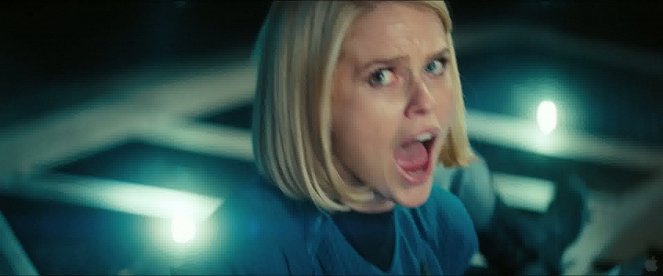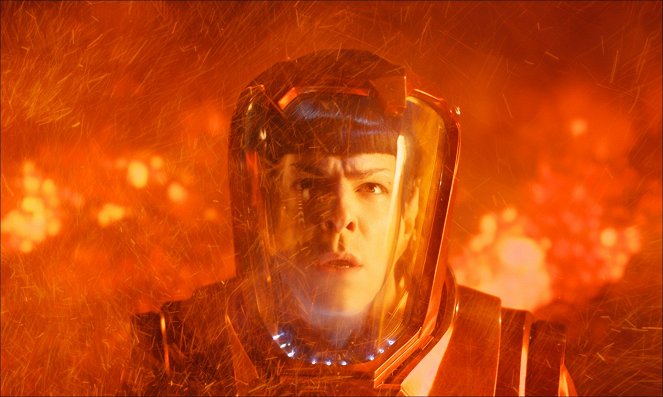Director:
J.J. AbramsCámara:
Dan MindelMúsica:
Michael GiacchinoReparto:
Chris Pine, Zachary Quinto, Zoe Saldana, Karl Urban, Simon Pegg, John Cho, Benedict Cumberbatch, Anton Yelchin, Bruce Greenwood, Peter Weller, Alice Eve (más)Streaming (4)
Sinopsis(1)
Cuando la tripulación del Enterprise sea convocada en su hogar, descubrirán que una imparable fuerza del terror desde dentro de su propia organización ha detonado la flota y todo lo que representa, dejando nuestro mundo en un estado de crisis. Con una puntuación personal que marcar, el Capitán Kirk liberará una caza humana a un mundo en guerra para capturar a un hombre que es un arma de destrucción masiva. Cuando nuestros héroes son propulsados a una partida de ajedrez entre la vida y la muerte, el amor será puesto a prueba, las amistades serán divididas , y deberán hacerse sacrificios por el bien de la única familia que le queda a Kirk: su tripulación. (Paramount Pictures España)
(más)Videos (36)
Reseñas (14)
I stared wide-eyed for two hours as if I were fifteen again. Nevertheless, I have two major criticisms to air. Abrams dragged on the concept of the first film without any significant innovation (the timing of the action scenes fits more or less one-to-one within the runtime) and, most importantly, he hardly works with the villain (and Cumberbatch provides him with what few others can). When I watch it the second time is when I'll decide if it was all on purpose and it's still all about the fire of catchphrases, perfect characters, and "absolute" moments like falling from space, or if J.J. is already on the other side of the galaxy with his thoughts.
()
I can hardly abstract from the emotional factor because, as in the previous episode, I felt at home swallowing Abrams' upgraded poetics of the rigid Federation and the less-clamped crew of the Enterprise to the fullest. In some ways, the flight into darkness is a little less consummate than its predecessor - it was actually atypically brisk, functional, dynamically connected and clever for a prologue. He built the foundations of a new mythology, paid homage to the old, and economically sketched the new chemistry of the characters. The sequel toils more with the explanation of some motivations and events, the last instance being deus ex machina, or a reference outside the world of film (to The Wrath of Khan, to the series episode "Space Seed", to the first Abrams ST, to the accompanying comics, etc.). As a result, Into Darkness may seem like a nerd encyclopedia with poor logic. To some extent, I agree. Anyway, if we abstract from the occasional naivety, unsuccessfully pointed dialogue, and a certain sparsity (or rather evasion) of the script, the film simply works. The film elegantly uses the established motifs, cleverly re-interprets familiar events with a raster of "changed reality", all while not forgetting to work with a key element of the new ST: the relationship between Kirk and Spock. In many ways, it surprisingly brings them together (fatherly motif, anger) while not only acting as a derivative of the original film duo. Cumberbatch in the role of Khan is probably the most successful transcript - he was able to combine a certain human fragility with the theatricality of Ricardo Montalbán, and he also acts as a catalyst: in some ways he is similar to Spock (superior physical and mental abilities), and in some ways to Kirk (obvious interest in improvisation and problems with self-control and order). In any case, he puts them both in a situation where they have to reconsider their basic attitudes and views on their service. Fortunately, he does not resemble in any way the "destructive fateful" villains that Christopher Nolan so masterfully constructed, but he is actually old-fashioned at his core (good old fashioned revenge). The new ST is primarily an attraction. At times, it seems that the obsessive fondness for thinking and rendering that the Star Trek series is famous for was set aside and was replaced by pure dynamics. Nevertheless, observing the ingenuity and dynamism of often parallel and precisely constructed actions brings almost infantile pleasure. So does experiencing bursts of nostalgia from familiar scenes that shine again and, despite a certain rational calculation, still work and enrich the new story. A film where everything is in place for me. Sometimes it's a bit mysterious how it got there, but ST simply offers enough for a viewer raised on Rodenberry's world to come to terms with it.
()
I loved the first movie of this restarted Star Trek series. It was full of action, good effects and it was fun, which is something I was grateful for. Four years ago, it was fun to discover a movie like this, but now these blockbusters are a dime in a dozen and it’s hard to find a really good one. But this one was great. It might not match up to the first movie’s quality, but it definitely comes close. Because Benedict Cumberbatch is absolutely perfect as a villain. And J.J. Abrams is an amazing director, so apart from digital orgasms, you also get plot twists and you get to build an even stronger relationship with actors such as Chris Pine, Zachary Quinto or Simon Pegg, which all makes me happy as a clam. You can clearly see the Star Trek fans in this movie. It’s just a shame that this movie has too little in common with the original decent Star Trek and a good portion of the fans can’t forgive the creators for that. If they only looked past it, they would enjoy a pleasant popcorn fun that has a message behind it, you just have to open up to it enough.
()
Star Trek for the whole family. Whereas the first modern Star Trek movie established bonds (not only between the characters, but between the characters and viewers unfamiliar with Star Trek), the sequel’s plot is built on the danger of those bonds being broken. Several of the alternative family models find themselves in peril. Kirk and Spock are driven by a thirst for revenge after their surrogate father is killed before their eyes. Carol is seeking a new, more trustworthy family onboard the Enterprise and Harrison’s crew has become his family as well. Thanks to the strong family subtext, Into Darkness is emotionally rich, but it doesn’t manage to directly face up to its melodramatic leanings (glycerine tears, Spock bellowing the villain’s name) and relativises them in every possible way through childish joking and placing them in a context that prevents the expression of emotion (Spock’s reaction, for example, is primarily a quote). The attempt at a constantly brisk narrative pace hinders the logical consistency of the story. The characters break or disregard regulations as it suits the screenwriter, some motivations are unclear and a lot of decisions are dubious. On the other hand, Abrams makes excellent use of every piece of the provided information, whether in the dialogue or action scenes (with shots that say more in one go than is common in today’s action movies). He continuously raises the stakes in the build-up of the action sequences: higher probability of error/greater loss, if errors occur/multiplication of objectives to be achieved through action. The final battle is an excellent example of how to overwhelm viewers with spectacle and, at the same time, make them think about the possible impacts of the actions that they have watched. Though it happens on the basis of an unconvincing chain of events, the scene itself is gripping. The dubious significance of similarly self-indulgent episodes in the narrative as a whole repeatedly points out to us that the film follows the narrative logic of television series (or video games). Many events have no consequences and stick out like a sore thumb, though they will thrill the mind of any nerd (a key scene from The Wrath of Khan turned upside down, Alice Eve in her underwear). It is not clear from the presented facts why some things happen in an exceedingly complicated way, or rather why some useless information is being provided to us (the circumstances leading to the explosion in the Archive). Other, more valuable information was left out for the sake of convenience (the improbably quick “modification” of 72 torpedoes before Harrison appropriates them, the premature cut-off of the rescue scene using a human chain, which doesn’t look solid at all). The new Star Trek would need to fill a lot of holes, but even with those holes, it is a top-rate summer blockbuster with a thrilling pace, a humanly monstrous bad guy and tremendous value added for everyone who has spent a fair amount of time in Gene Rodenberry’s world. 85%
()
(menos)
(más)
Massive disappointment from J.J. Abrams, the first time ever. Effective eye candy, but it didn’t bring me any pleasure at all. The story is told so sloppily that I actually don’t know what it was about. Everything is ancillary to the glossiness and the pace – before the dust can settle after a twist, there comes another twist, and everything is now different; the movie won’t allow you to understand that turn of events because the plot never goes very deep. Important decisions that would need hours if not days of pondering here are made in a few microseconds. Just whoosh here, whoosh there, it doesn’t matter after all. At its most basic, from one scene to the next, it does work (you can follow the short-term motivations of the characters), but who wanted to do what long-term is something that I’m unable to put together and I fear it simply doesn’t make any sense; not even a bit. The fact that everyone speaks in dull one-liners doesn’t help either. The second Star Trek cheered me up a little only by the end, when it managed to arouse some emotions (I loved the first one, though), but it took me only a few seconds to realise that nothing had really happened, and I guessed exactly the gimmick the movie will use next to reach its nonconflicting goal. So, overall, I'm quite bitter. A film with a very charismatic villain played very charismatically by a very charismatic actor until you realise you don’t know anything about him and you only remember a couple of psychopathic grimaces doesn’t deserve a higher rating.
()



Anuncio